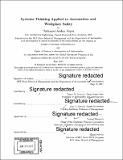Systems thinking applied to automation and workplace safety
Author(s)
Peper, Nathaniel Arthur
DownloadFull printable version (12.21Mb)
Alternative title
Systems-Theoretic Process Analysis
Other Contributors
Leaders for Global Operations Program.
Advisor
Nancy G. Leveson and John S. Carroll.
Terms of use
Metadata
Show full item recordAbstract
This thesis presents the results of a study to compare Systems-Theoretic Process Analysis (STPA), a hazard analysis methodology based on a new model of accident causation called Systems-Theoretic Accident Model and Processes (STAMP), with the traditional assessments recommended by industry standards for analyzing safety risks in modern manufacturing workplaces that are increasingly incorporating automated systems. These increasingly complex, modern socio-technical systems are introducing new problems in the manufacturing environment that traditional methods of analysis were not designed to analyze. While these traditional methods have previously proven effective at analyzing hazards, the increasing levels of complexity and technological advancement in the factories are surpassing the limits of traditional assessment capabilities. Today's continuous search for opportunities to automate manufacturing process makes this a critical time to ensure that the hazard analysis methodologies in use are capable of providing an effective and efficient analysis. STAMP and STPA were developed specifically to understand and analyze modern, complex socio-technical systems that are introducing new types of accidents with causes beyond traditional component failures. This thesis provides background and discussion of traditional models and methods, of the current industry standard method, and of the proposed method. The current and proposed methods are then used on an actual semi-automated manufacturing process being implemented in an aerospace manufacturing company and analyzed with a set of criteria to determine their effectiveness and efficiency. The results of this analysis determine that STPA is better equipped for the modern manufacturing environment.
Description
Thesis: M.B.A., Massachusetts Institute of Technology, Sloan School of Management, in conjunction with the Leaders for Global Operations Program at MIT, 2017. Thesis: S.M., Massachusetts Institute of Technology, Department of Aeronautics and Astronautics, in conjunction with the Leaders for Global Operations Program at MIT, 2017. Cataloged from PDF version of thesis. Includes bibliographical references (pages 107-109).
Date issued
2017Department
Leaders for Global Operations Program at MIT; Massachusetts Institute of Technology. Department of Aeronautics and Astronautics; Sloan School of ManagementPublisher
Massachusetts Institute of Technology
Keywords
Sloan School of Management., Aeronautics and Astronautics., Leaders for Global Operations Program.